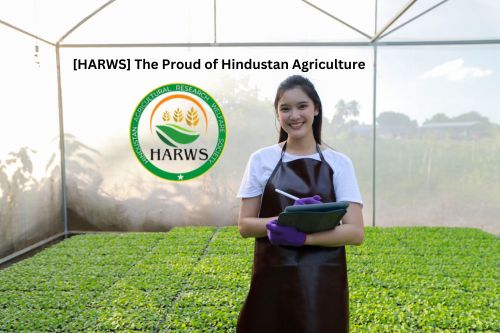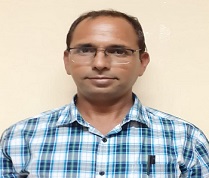Hindustan Agricultural Research Welfare Society founded in 2019, a non-governmental/ autonomous research and educational organization was registered under the societies Act 1860. Society is also registered in Indian Trust Act, Indian Society Act & Ministry of MSME Govt. of India.Hindustan Agricultural Research Welfare Society founded in 2019, a non-governmental/ autonomous research and educational organization was registered under the societies Act 1860. Society is also registered in Indian Trust Act, Indian Society Act & Ministry of MSME Govt. of India.
HARWS is mainly engaged in promotion of research in the field of Agricultural and Allied Science, Social Sciences and Biological Sciences for the development of wellbeing of mankind and farmers. Society is also working in the area of conservation of nature and environment. HARWS is organizing workshop and training program, symposium, summits on different burning and challenging issue at National and International level. It is also delivering support and services to educators, researchers and farmers around the world. The main objective/aims of the society are to promote and disseminate knowledge in Agricultural and Allied Science, Medical Science, Social Sciences, Biological and Physical Sciences for sustainable development to make world cleaner-greener. The first step of society in the right direction would come from educating and motivating young minds on the possibilities that this area entails for scientific exploration. The Society has continually expanded and has now on its roll, more than 200 members from India and abroad which include more than 86 Life Members and 66 are effective annual members. The Society has 5 foreign members and 4 Honorary Fellows. Society providing two National and International forum for publication of the research findings in the peer-reviewed and widely circulated official publication of the Society, Nature times & Agri Meet “An International Multidisciplinary Magazine.



The aims and objectives of the Society shall be to:
Constitution OF Hindustan Agricultural Research &Welfare society Agra (Registered under the Societies Registration Act XXI of 1860)
Name
The name of the Society shall be Hindustan Agricultural Research &Welfare society Agra
The Life and an Ordinary Members shall have the right to vote at all meetings of the General Body, to propose candidates for admission to the Society and shall have other rights, privileges and duties as mentioned in various sections of this Constitution and amended from time to time by the General Body. They shall also be entitled, so long as their annual subscription (in case of annual members) is not in arrears, to receive a printed copy of each issue of the Society’s journal and such other publications of the Society as the Executive Council may determine and, access to all the publications on the Society’s website.
The rights and privileges of a member will cease in case of default in dues to the Society of the type and duration determined by the General Body.
Honorary members shall enjoy all the privileges of Ordinary Members without having to pay the subscription, except that they shall not be eligible to contest for any office or vote at the meetings of the General Body, if they are not also life or ordinary members.
The General Body meeting of the Society shall be presided by the President, or by the senior most (senior by age) Vice-President available, or by the Secretary, or by a member of the Council elected at the meeting for this purpose, in that order depending on the presence in the meeting once the notice of the meeting has been issued by the Secretary as decided by the Executive Council.
An extraordinary meeting of the Society may be called with a notice of at least fifteen days if fifty of those members of the Society who are eligible to vote shall send a requisition to the Secretary for such a meeting.
The General Body of the Society shall meet normally, once in a year, any time during the last two months in a calendar year. The meeting shall, however, be held not later than January of the succeeding calendar year. The date of the Annual General Body Meeting shall be announced by the Executive Council at least one month before the meeting and the Secretary will notify the date by e-mail to all members and also confirmed by letter. All notices of motions shall be received by the Secretary at least one month before the meeting.
There shall be an Executive Council, which shall carry on all the affairs of the Society in accordance with the Constitution and policy and rules of the Society fixed and approved by the General Body.
The Executive Council shall consist of a President, two Vice-Presidents, a Secretary, a Treasurer, an Editor, and six Councillors elected by the General Body.
The Executive Council shall be elected for two years. No member, except the Editor, will hold the same executive office for more than two consecutive terms and not more than one term if he/she has held any other office in any earlier term. To maintain the continuity in the publication policy and standards the Editor can seek election for three consecutive term of two years each. Keeping the dignity of the position of the President in view, any member who has served as President can seek re-election as President for only one more term but only after the lapse of three terms after the term in which he/she held the post.
Duties and privileges of the Secretary :
1). The Secretary shall be responsible for calling, in consultation with the President, meetings of the General Body and the Executive Council, recording the proceeding of the meetings of the General Body and Executive Council meetings of the Society and shall take appropriate actions to implement the recommendations and resolutions of the Executive Council and of the General Body. The proceedings of any Executive Council meeting shall be signed by all members present in the meeting before dispersing. The Clause 28 below shall prevail in the case of either the Secretary or the President or both, are responsible for not calling meetings and the meeting will be called by any member of the Executive Council.
2). The Secretary shall be responsible for conducting all day-today business, for administering the funds in consultation with the Treasurer of the Society and for maintaining the establishment in accordance with the powers assigned to him/her by the General Body from time to time as provided in the Executive Constitution. For this purpose he shall be given an appropriate administrative staff appointed on a contractual basis and office facilities paid for from the Society’s funds.
3). In case of long absence or resignation of the Treasurer, the Secretary shall also function as Treasurer till the Treasurer joins back or a new Treasurer is nominated by the Executive Council from among the Executive Council members available at the Headquarters or, in case of non availability of a Council member, a general member available at the Headquarters. However, when the Secretary has to execute the duties of the Treasurer in matters relating to financial expenditures he/she shall exercise the power in conjunction with another member nominated by the Executive Council for this purpose. Only in cases of extreme urgency the Secretary himself/herself shall exercise the powers of the Treasurer subject to ratification by the Executive Council.
4). In the case of long absence or non-availability of the Secretary, the Executive Council will nominate a member of the Executive Council (other than the Treasurer) available at the Headquarters, or in the case of non-availability of such a member, a general member available at the Headquarters to act as the Secretary for the remaining period of the term of the Executive Council.
Duties and privileges of the Editor
1). The Editor shall be head of the Editorial Board constituted by the Executive Council. The members, ten in number, of the Editorial Board will represent, as far as possible, different sub specializations of genetics and plant breeding. The Editor will suggest a panel of 20 names out of which the Council will select in consultation with the Editor ten names. In the case of discontinuation of any of the Editorial Board members the Executive Council will select substitutes from the panel submitted by the Editor. The functioning of the Editorial Board will be reviewed by the Executive Council each year and, if necessary, appropriate changes will be made in its composition in consultation with the Editor.
2). The Executive Council shall also appoint two Associate Editors coterminous with the tenure of the Editor out of a panel of five members recommended by the Editor to assist the Editor in publication of the Journal and other publications of the Society. The Editor will report to the Executive Council on the performance of the Associate Editors yearly, each based on which the Executive Council will take appropriate decisions.
Duties and privileges of the Councillors
1).The Zonal Councillors shall advise the Council on the working of the Society as defined above at its meetings.
2).They shall be responsible for efficient functioning and activities of the respective zonal and local chapters of the Society.
All elections to the offices shall take place through secret postal ballot by all life and ordinary members (whose dues are cleared) at least one month before the expiry of the term of the incumbent Executive Council.
A returning officer for this purpose will be appointed by the Executive Council in its penultimate quarterly meeting. The returning officer will notify the election and call for nominations by at least two eligible members for each nomination, from among the existing eligible members subject to Rule 18 above and Rules 35 and 36 below, for various posts of the Executive Council within fifteen days of his/her appointment by e-mail, to the eligible members of the Society and the call for elections will also be posted on the Society’s website. The last date for receipt of nominations along with the acceptance by the nominees will be the 30th day after notification (the date of notification not included). The last date for withdrawal of nominations will be the fifteenth day after the last date of receipt of nominations. The returning officer shall dispatch the list of nominations to each eligible member of the Society by e-mail and shall post the same on the website of the Society within 15 days of the last date of withdrawal of nominations. A copy of the ballot paper will be sent by email and posted on the website of the Society. The members of the Society will send their votes on the prescribed ballot paper by ordinary post in closed double envelopes as instructed by the returning officer and mentioned on the ballot paper, to the address of the returning officer so as to reach the returning officer not later than the twenty-fifth day of posting of the list of nominations on the website of the Society. The returning officer will announce the results of election on the website of the Society within five days after the last date of receipt of the votes and simultaneously also give the results of the election in writing under his/her signature to the Secretary. The elected Executive will assume office immediately after the election as early as possible, but not later than 21 days of the announcement of results of election.
Keeping in view the high dignity of the post of the President of the Society and that the reputation of its President is one of the important determinants of the dignity of the Society. The nomination for the post of the President shall be done by a Collegium of past Presidents, Secretaries and Editors, comprising four each of the immediate past and surviving Presidents, Secretaries and Editors of the Society and the incumbent President, Secretary and Editor. The Collegium will be notified by the outgoing Executive Council after the date of election is decided. The senior most (by age) past President in the Collegium will preside over the Collegium and the incumbent Secretary will be the Member Secretary. The members of the Collegium will consider the nominations received from the members (including the members of collegium) of the Society. The Collegium shall select from among the nominations by deciding on the basis of a simple majority a panel of five eligible members of the Society well known for their contribution to the sciences of genetics and plant breeding. A transparent and unbiased set of criteria for selection of the panel will be decided by the Collegium and will be put in its proceedings when selection is made. If any information is required by the Collegium for deciding on the criteria, the Secretary will arrange to collect the information from the nominators. The members of the Society will elect one of the members of the selected panel as the President.
Also keeping in view the fact that the publications of the Society are the face of the Society and the Society is known and valued by them, it is essential that the Editor is a well known scientist in the field of genetics and plant breeding with proven ability to review and edit scientific and technical publications with impartiality to ensure that Society’s publications are of high quality. The selection of a panel for the post of the Editor shall also be done by the Collegium appointed for the selection for the panel of the President. The procedure of nomination will be same as that for the President. The Collegium shall nominate on the basis of simple majority a panel of maximum five eligible members of the Society suitable for the post of Editor. The members of the Society will elect one of the members of the selected panel as the Editor.
Conference/Symposia
The Society will organize Indian Agriculure Congress at 1 yearly intervals. The Congress will cover all disciplines related to science. The Society will also organize one-day annual symposia on the important current topic of Agriculture on the occasion of Annual General Body meeting.
Headquarters
The Headquarters of the Society shall be the Village – Benai khurd, post – Mahawatpur Dist.- Agra 283201






